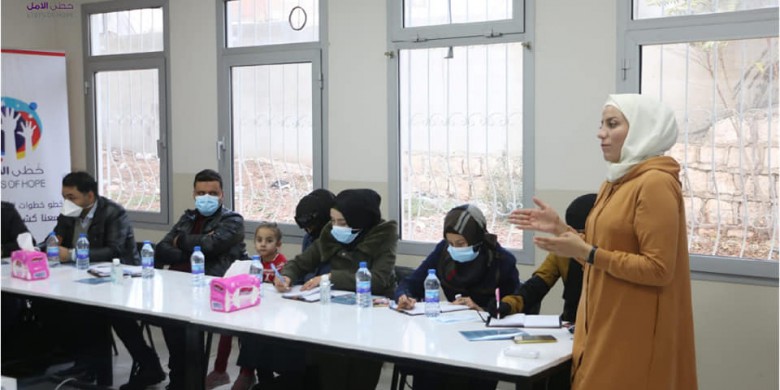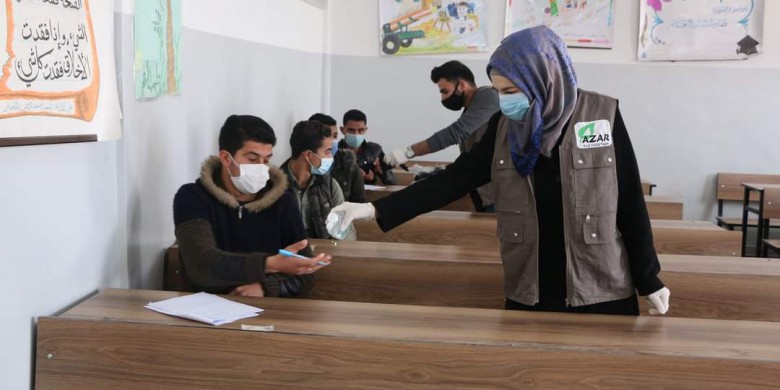
Syrian Youth and the Violence of Exclusion
“Local Voices at a Crossroads” is an article series in which local actors of everyday peace share their insights into the fragilities and resilience of their societies in the face of conflict. Grassroots societies lie at the crossroads between local realities and national peacebuilding policies and practices. The series therefore aims to accelerate action at the local level by strengthening the voices of civil society at the policy level. “Local Voices at a Crossroads” is hosted by the Civil Society Platform for Peacebuilding and Statebuilding (CSPPS) and emerged from a collaboration with the Political Settlements Research Programme (PSRP*), based at the University of Edinburgh.
Syrian students as main victims of the conflict
When a human wave of peaceful protesters spread across Syria in early 2011 to demand more rights and governmental accountability, and was severely repressed by the Syrian army, Syrian students assumed a central role in anti-regime demonstrations. The protests gave birth to a student civil movement concentrated around the University of Damascus and the University of Aleppo, the two oldest higher education institutions in the country. In May 2012, for instance, students took advantage of the visit of international observers sent by the United Nations by rallying 15,000 protesters and demanding the fall of the regime of Bashar al-Assad. Students became a major concern for the Syrian president, who launched a campaign of arrests, intimidation, and targeted killing against academics and students who were believed to make up to one-quarter of fatalities in the Syrian protests as of early 2012. In January 2013, the Syrian regime bombed student dorms of the University of Aleppo, killing 87 and wounding more than 160. In addition, the security and intelligence forces increased their presence on campuses and tightened their control through student enrolments in higher education. Increased insecurity, displacement, and the war economy pushed around 100,000 university students to drop out by early 2015, according to Syrian Government statistics.
Despite these accumulated challenges, the Syrian government claimed that 600,000 students were enrolled in universities and technical institutes in January 2016. In opposition-held areas that slipped out of control of the Syrian regime in 2015, de facto opposition governments in the northwest of the country also ensured the survival of higher education amid the conflict. In 2015, the Syrian Interim government announced the establishment of a new university under the name Free Aleppo University, in remembrance of those who lost their lives during the bombing of the University of Aleppo in January 2013. In 2019, seven universities in opposition-held areas employed hundreds of dissident academics who refused to flee the country and an estimated 16,000 students. Where the violence of exclusion compounds the violence of the conflict, universities often represent the last hope, and are the key institutions to mitigate the lack of opportunities and inclusion of youth in the society and the political process. For many, graduating is a necessary step to work at a trade or in a profession and, thereby, to be financially independent and start a family. But universities also provide many volunteering opportunities, giving youth a sense of purpose and fostering socio-political inclusion through civil society activities.

The challenges of interrupted education
Ayman is a 35-year-old medical student who will graduate after one final exam. It has always been his dream to become a doctor but, despite eight years of experience working in emergency services during the violent siege of Ghouta in eastern Damascus, he cannot practice because he never finished his education. As a student and aspiring doctor, Ayman was targeted by the Syrian regime at the beginning of the protests and eventually fled to the opposition-held areas in the northern countryside of Aleppo, where he enrolled at the Free University of Aleppo. This is his last chance to graduate and practice medicine. Ayman is not an isolated case: hundreds of students joined universities in opposition-held areas in the hope of finishing their education. Duha, a 28-year-old student from Eastern Ghouta, also interrupted her studies twice after she was forcibly displaced to Idlib and Afrin, more than 300 kilometres from her hometown. She used to study at the prestigious Institute of Business Administration and had only one year left until graduation. Yet, she had no other choice but to start her degree from scratch each time she enrolled in a new university.
Cases like those of Duha prompted universities in opposition-held areas to adapt their enrolment systems to allow dropout students who were forcibly displaced as a consequence of the conflict to pursue the degree they started in another institution. The only requirement for students is to provide an academic transcript of the grades they obtained in their previous university. But the lack of a unified higher education system across governments in Syria remains a serious challenge for dropout students. Ayman sought the help of a lawyer to obtain an academic transcript from the university he used to attend in Ghouta, which fell back under the control of the Syrian government in 2018. The lawyer asked for $1,000 to complete the process, a prohibiting amount for unemployed students who are already the victims of a war economy.
“Life must go on and we have to prove to people that we are able to love life as much as we did before the conflict”.
Another challenge for students discontinuing their studies is the need to adapt to the changing socio-cultural settings of multiple universities. Duha explains that she felt marginalised when she started attending the Free University of Aleppo. She did not know anyone and had to adapt to mixed-sex classrooms, which made her inclusion even more challenging due to the conservative socio-cultural heritage in the region. Duha eventually made friends and got involved in voluntary campaigns organised by the university. She distributed masks to students during the COVID-19 pandemic, decorated the streets and public space of the city, and collected, repaired, and redistributed old books to poor students. While she was initially reluctant to participate in voluntary activities where both men and women worked together, she eventually realised the potential of participative initiatives which include both resident and displaced students. She explained: “Life must go on and we have to prove to people that we are able to love life as much as we did before the conflict”.

Universities as key drivers of social change
Abdul Qadir, a 32-year-old student at the College of Education of the University of Aleppo, reflected on the challenges for female students to integrate into the student body while living in his home city, Azaz, which preserved its conservative and traditional cultural heritage throughout the conflict. He explained: “When a woman goes back to her family after a day of studying, she talks of mixed-sex education or friendship. If her words are misunderstood or her behaviour is considered inappropriate by conservative family members, she can be prohibited from finishing her degree”. Abdul Qadir added: “We are proud of our customs and traditions, but we must acknowledge that the society has changed and that our values and customs are not the only frames of reference anymore”. The city of Azaz indeed witnessed dramatic socio-demographic changes during the conflict. It is often referred to as “a miniaturized Syria” in reference to the arrival of around 200,000 displaced Syrians from all over the country, who now represent 65% of the city’s population according to the city council. The establishment of the Free University of Aleppo in Azaz in 2015 also brought about a radical change. Before that, the closest university was located in Aleppo, about 30 kilometres away from Azaz. Students used to commute between cities and social norms: a traditional Azaz and a more cosmopolitan Aleppo. Today, the arrival of about 7,500 students in Azaz has shifted the city’s landscape. Abdal Qadir narrates: “When I walk on the streets of the city, I can see that the dress code is more varied and reflects the different customs of Syrian people. Restaurants are also more varied. Everything is different from 10 years ago. We used to know everyone and shared cultural norms. Now we learn about different people and customs.”
"We must [..] learn how to respect each other and work together to develop a pluralistic Syria, that integrates all its members and maintains our cultural heritage”
The establishment of the university not only brought about a change of mentality regarding education, but also of civil society. Before 2015, there were no volunteer teams in Azaz, and only one woman used to work in a civil society organisation. Today, there are dozens of volunteer teams and women assume a central role in local civil society. Beyond gender integration, civil society engagement through the university also provides a common platform for residents and displaced youth. The multiplication of inclusive initiatives created an environment that fosters creativity and positive competition, which helped women out of their isolation. Young women now represent more than half of the student body in Azaz and more than half of the volunteers in civic engagement initiatives. One of these women is Randa, a 28-year-old feminist activist from Azaz who studies engineering. She witnessed the increase of the community’s acceptance of women’s involvement in society, which translated into increased demand for activities related to women. Randa explained: “Today, the social fabric is no longer divided between cities and villages as it used to be. The opposition-held areas are relatively small for the population it hosts, so we have to live together. We must adapt to these circumstances and learn how to respect each other and work together to develop a pluralistic Syria, that integrates all its members and maintains our cultural heritage”. This mission, promoted through higher education, gives a central role to youth and the opportunity for them to feel more included in the (re)construction of their country.
_________________________________________________
Raise your voice! Contact us to share your or others’ experiences of vulnerability and resilience to conflict and efforts for peace.
Article written by Abdulah El hafi
Abdulah El hafi co-founded and managed the Unified Relief Office in Eastern Ghouta and sat on the board of directors for two years. In 2013, he was a founding member of the Civil Defense in Eastern Ghouta in Rif Damascus. From 2014 to 2019, Abdulah worked as a coordinator and field manager for several programs funded by the British DFID and USAID. He also delivers trainings in the field of good governance and capacity building for several local organizations, teams and councils in Rif Damascus, Idlib, and northern Aleppo governorates. Currently, Abdulah is working as the manager of the Local Administrative Councils Unit (LACU) Syria Office.
*The Political Settlements Research Programme is a partner of the Covid Collective. The Collective brings together the expertise of UK and Southern-based research partner organisations and offers a rapid social science research response to inform decision-making on some of the most pressing Covid-19 related development challenges. The PSRP and Covid Collective are supported by the UK FCDO.
